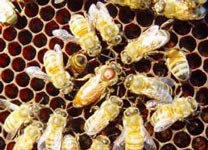Queen bees are more promiscuous, herds are stronger
The more prolific the queen bees and endless encounters, the more healthy the herds are created.
 Researchers have found that royal honey bees mate with a multitude of males that will produce a high diversity of bees. This diversity means that they will cope better with disease.
Researchers have found that royal honey bees mate with a multitude of males that will produce a high diversity of bees. This diversity means that they will cope better with disease.
With many heads of insects such as bees and ants, mating activities pay a heavy price. For example, honeybees, this activity requires organisms to fly many kilometers to different places to date males, the longer it stays to be pleasurable, the more precious energy is lost, and the more risk of being eaten by enemies.
This has led experts to wonder why some of the insects of some insects will let themselves go on such endless encounters, while others need only one male. Many hypotheses including genetic diversity will help improve the division of labor in the herd, or indiscriminate mating is a simple way to collect more sperm.
But the most persuasive hypothesis is probably the god who collected so many mates to create a herd of antagonists better with illness. "Insects that live in nutrient-rich environments are the lair of viruses - so they need a mechanism to protect themselves from disease," said David Tarpy at the University of North Carolina in the US.
In order to test this hypothesis, Tarpy injected into the sperm honey bee of 1 or 10 males. These many queen bees or a partner are facilitated to form different herds. Later, the scientists sprayed on high-level, highly infectious bees. Each group will be tested within 5-9 weeks.
Although no herd has completely escaped infection, herds of queen bees have a particularly weak partner and are more severely dispersed.
The results confirm that indiscriminate mating increases the parasite's resistance to parasites, helping them not to be swept away at the same time, the researchers said.
MT
- Queen bees promiscuous for descendants
- Find out the 'secret' to make honey bees into queen bees
- The secret of bees
- Becoming a queen bee or worker bee is decided by the parasite flies
- Why bees cannibalism?
- 20,000 bees make 3 flights not take off
- Close-up of the first 21 days of bee life
- Herds of bees are ready to suppress opponents aggressively
- The species of bees disappears, the species is extinct
- 9 quirky queens in world history
- The world's first vaccine for honey bees
- The smartest man in the animal world
 Why do potatoes have eyes?
Why do potatoes have eyes? 'Tragedy' the world's largest carnivorous life: Death becomes ... public toilet
'Tragedy' the world's largest carnivorous life: Death becomes ... public toilet Tomatoes were once considered 'poisonous' for 200 years
Tomatoes were once considered 'poisonous' for 200 years Detecting microscopic parasites on human face
Detecting microscopic parasites on human face